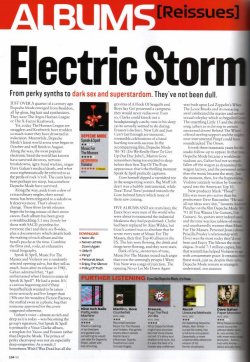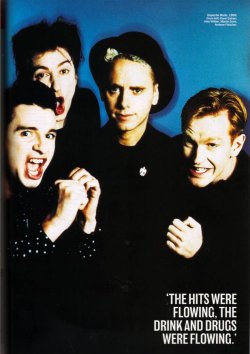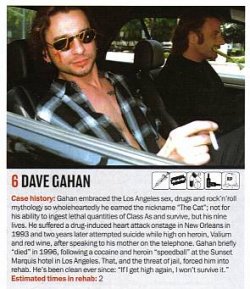Electric Storm
[Q, May 2006. Words: John Aizlewood. Picture: Uncredited.]


Just over a quarter of a century ago Depeche Mode emerged from Basildon, all lip-gloss, big hair and synthesizers. They were The Argos Human League, or The X-Factor Kraftwerk.
Yet, today The Human League are stragglers and Kraftwerk have trodden so much water they have drowned in indecision. Meanwhile, Depeche Mode’s latest world arena tour began in October and will finish in August. Along the way, the most popular electronic band the world has known have survived divorces, nervous breakdowns, intra-band warfare, singer Dave Gahan’s medical death, and what must euphemistically be referred to as the perils of rock’n’roll. The costs have been perhaps too steep, but somehow Depeche Mode have survived.
Along the way, aside from a slew of extraordinary singles, their actual music has been relegated to a sideshow. It deserves more. That’s about to change. These three lavish releases begin the loving reissue of their entire canon. Each album has been given a swashbuckling 5.1 mix (lovely for those with SACD, pointless for everyone else) and there are B-sides, plus a documentary which details both the making of the album and the band’s psyche at the time. Combine the films and, voila, an exhaustive visual biography.
Speak & Spell, Music For The Masses and Violator are a randomly selected opening salvo, but they tell us much. Soon after its release in 1981, Gahan admitted that, “I get embarrassed when I listen to some of Speak & Spell”. He had a point. It’s a curious beginning and if these bequiffed kids wanted to be taken more seriously and live longer that (‘80s one-hit wonders) Fiction Factory, the stuffed swan in a plastic bag that someone approved for the cover suggested otherwise.
Gahan’s voice – almost as rich and deep as it is today – was becoming the group’s signature, but Speak & Spell is primarily a Vince Clarke album, a template for Yazoo and Erasure rather than Depeche Mode. The prince of perky electropop was not an especially deep songwriter. As a result, I Sometimes Wish I Was Dead has all the gravitas of A Flock Of Seagull’s and Boys Say Go! Possessed a campness they would never rediscover. Even so, Clarke could knock out a headspinningly catchy tune in his sleep (as he actually seemed to do during Erasure’s decline). New Life and Just Can’t Get Enough are innocent, irresistible celebrations of a band hurtling towards success. In the accompanying film, Depeche Mode ’80-’81 (Do We Really Have To Give Up Our Day Jobs?), Martin Gore remembers being too excited to sleep before their first Top Of The Pops appearance: that’s the thrilling moment Speak & Spell perfectly captures.
Gore himself dipped a varnished toe in the songwriting waters. Big Muff (oh dear) [1] was a bubbly instrumental, while Tora! Tora! Tora! pointed towards the Gore-helmed future which none of them saw coming.
Five albums and six years later, the Essex boys were men of the world who were about to transcend the industrial bleakness they had popularised. Clarke had been replaced by Alan Wilder, but Gore’s control was so absolute that he wrote every note of Music For The Masses, their first Top 40 album in the US. The hits were flowing, the drunk and drugs were flowing, and they were stars.
Dark of lyric, stentorian of tone, Music For The Masses oozed such angst that even the seemingly priapic I Want You Now was a saga of rejection. The opening Never Let Me Down Again was built upon Led Zeppelin’s When The Levee Breaks and its menacing swirl celebrated the master and servant sexual roleplay which so beguiled Gore. The unsettling Little 15 and the driving song (albeit driving as in driving to certain emotional doom) Behind The Wheel offered sterling support and the mighty near-instrumental Pimpf could have soundtracked The Omen.
It took three traumatic years for the studio follow-up to appear. In that time Depeche Mode became a worldwide stadium act, Gahan had not so much fallen off the wagon as dynamited the wagon factory, and the personnel rather than the music became the story. Just the moment, then, for the hypnotising Violator (entirely written by Gore) to speed into the American Top 10.
New producer Mark “Flood” Ellis was more pro-active than his predecessor Dave Bascombe: “He said all our ideas were shit,” laments Andrew Fletcher on the film Depeche Mode ’89-’91 (If You Wanna Use Guitars, Use Guitars). So, guitars were indeed used, and the tone was less tablets-of-stone and unashamedly warmer than Music For The Masses. Personal Jesus (about Priscilla Presley’s relationship with Elvis) was the most rocky they’d ever been and Enjoy The Silence the most elegiac. It sold 7.5 million copies, but that warmth has helped Violator to age with consummate grace. It remains their finest work, just as, despite their sales, Depeche Mode remain so strangely underrated.
Further Listening
If you like Depeche Mode, try these…
Nine Inch Nails
Pretty Hate Machine [4]
Flood’s mashing of synthesizers and guitars was something he would use later for Depeche Mode, albeit with less shouting.
Martin L. Gore
Counterfeit [3]
Recorded between Music For The Masses and Violator, this gentle covers album details Martin Gore’s influences: Sparks, Tuxedomoon and Comsat Angels.
Erasure
Pop! The First 20 Hits [4]
What Depeche Mode might have sounded like had Vince Clarke not left. It’s shiny and shallow to be sure, but it’s also the best of a master pop craftsman.
Recoil
Unsound Methods [3]
On departing Depeche Mode, Alan Wilder turned his hobby into a full-time occupation. Essentially, a more unashamedly electronic version of his former employers.
Dave Gahan
Paper Monsters [3]
What Depeche Mode would sound like without Martin Gore, ie, very similar, but with more rocky songs and lyrics – from a man who knows – about actually dying.
[Excerpt from the 50 Essential Tracks feature]
[8] Personal Jesus
Depeche Mode
Definitive Depeche Mode anthem (see page 134) [that is, the above article] that marked the beginning of Dave Gahan’s rise to rock god status… and his descent into drug addled despair.
[Excerpt from the "Rehab Special" feature]
[6] Dave Gahan
Case history: Gahan embraced the Los Angeles sex, drugs and rock’n’roll mythology so wholeheartedly he earned the nickname “The Cat”; not for his ability to ingest lethal quantities of Class As and survive, but his nine lives. He suffered a drug-induced heart attack onstage in New Orleans in 1993 and two years later attempted suicide while high on heroin, Valium and red wine, after speaking to his mother on the telephone. Gahan briefly “died” in 1996, following a cocaine and heroin “speedball” at the Sunset Marquis hotel in Los Angeles. That, and the threat of jail, forced him into rehab. He’s been clean ever since: “If I get high again, I won’t survive it.”
Estimated times in rehab: 2
[Q, May 2006. Words: John Aizlewood. Picture: Uncredited.]
A warm and well-informed survey of the first three remastered album re-releases: Violator, Speak And Spell and Music For The Masses. If anything, the author spends less time on Violator. The result is a balanced view of the band through three snapshots of their career. Most usefully for a collector, the author does take time to discuss the bonus features and not just the music.
" Along the way, aside from a slew of extraordinary singles, their actual music has been relegated to a sideshow. It deserves more. "


Just over a quarter of a century ago Depeche Mode emerged from Basildon, all lip-gloss, big hair and synthesizers. They were The Argos Human League, or The X-Factor Kraftwerk.
Yet, today The Human League are stragglers and Kraftwerk have trodden so much water they have drowned in indecision. Meanwhile, Depeche Mode’s latest world arena tour began in October and will finish in August. Along the way, the most popular electronic band the world has known have survived divorces, nervous breakdowns, intra-band warfare, singer Dave Gahan’s medical death, and what must euphemistically be referred to as the perils of rock’n’roll. The costs have been perhaps too steep, but somehow Depeche Mode have survived.
Along the way, aside from a slew of extraordinary singles, their actual music has been relegated to a sideshow. It deserves more. That’s about to change. These three lavish releases begin the loving reissue of their entire canon. Each album has been given a swashbuckling 5.1 mix (lovely for those with SACD, pointless for everyone else) and there are B-sides, plus a documentary which details both the making of the album and the band’s psyche at the time. Combine the films and, voila, an exhaustive visual biography.
Speak & Spell, Music For The Masses and Violator are a randomly selected opening salvo, but they tell us much. Soon after its release in 1981, Gahan admitted that, “I get embarrassed when I listen to some of Speak & Spell”. He had a point. It’s a curious beginning and if these bequiffed kids wanted to be taken more seriously and live longer that (‘80s one-hit wonders) Fiction Factory, the stuffed swan in a plastic bag that someone approved for the cover suggested otherwise.
Gahan’s voice – almost as rich and deep as it is today – was becoming the group’s signature, but Speak & Spell is primarily a Vince Clarke album, a template for Yazoo and Erasure rather than Depeche Mode. The prince of perky electropop was not an especially deep songwriter. As a result, I Sometimes Wish I Was Dead has all the gravitas of A Flock Of Seagull’s and Boys Say Go! Possessed a campness they would never rediscover. Even so, Clarke could knock out a headspinningly catchy tune in his sleep (as he actually seemed to do during Erasure’s decline). New Life and Just Can’t Get Enough are innocent, irresistible celebrations of a band hurtling towards success. In the accompanying film, Depeche Mode ’80-’81 (Do We Really Have To Give Up Our Day Jobs?), Martin Gore remembers being too excited to sleep before their first Top Of The Pops appearance: that’s the thrilling moment Speak & Spell perfectly captures.
Gore himself dipped a varnished toe in the songwriting waters. Big Muff (oh dear) [1] was a bubbly instrumental, while Tora! Tora! Tora! pointed towards the Gore-helmed future which none of them saw coming.
Five albums and six years later, the Essex boys were men of the world who were about to transcend the industrial bleakness they had popularised. Clarke had been replaced by Alan Wilder, but Gore’s control was so absolute that he wrote every note of Music For The Masses, their first Top 40 album in the US. The hits were flowing, the drunk and drugs were flowing, and they were stars.
Dark of lyric, stentorian of tone, Music For The Masses oozed such angst that even the seemingly priapic I Want You Now was a saga of rejection. The opening Never Let Me Down Again was built upon Led Zeppelin’s When The Levee Breaks and its menacing swirl celebrated the master and servant sexual roleplay which so beguiled Gore. The unsettling Little 15 and the driving song (albeit driving as in driving to certain emotional doom) Behind The Wheel offered sterling support and the mighty near-instrumental Pimpf could have soundtracked The Omen.
It took three traumatic years for the studio follow-up to appear. In that time Depeche Mode became a worldwide stadium act, Gahan had not so much fallen off the wagon as dynamited the wagon factory, and the personnel rather than the music became the story. Just the moment, then, for the hypnotising Violator (entirely written by Gore) to speed into the American Top 10.
New producer Mark “Flood” Ellis was more pro-active than his predecessor Dave Bascombe: “He said all our ideas were shit,” laments Andrew Fletcher on the film Depeche Mode ’89-’91 (If You Wanna Use Guitars, Use Guitars). So, guitars were indeed used, and the tone was less tablets-of-stone and unashamedly warmer than Music For The Masses. Personal Jesus (about Priscilla Presley’s relationship with Elvis) was the most rocky they’d ever been and Enjoy The Silence the most elegiac. It sold 7.5 million copies, but that warmth has helped Violator to age with consummate grace. It remains their finest work, just as, despite their sales, Depeche Mode remain so strangely underrated.
Further Listening
If you like Depeche Mode, try these…
Nine Inch Nails
Pretty Hate Machine [4]
Flood’s mashing of synthesizers and guitars was something he would use later for Depeche Mode, albeit with less shouting.
Martin L. Gore
Counterfeit [3]
Recorded between Music For The Masses and Violator, this gentle covers album details Martin Gore’s influences: Sparks, Tuxedomoon and Comsat Angels.
Erasure
Pop! The First 20 Hits [4]
What Depeche Mode might have sounded like had Vince Clarke not left. It’s shiny and shallow to be sure, but it’s also the best of a master pop craftsman.
Recoil
Unsound Methods [3]
On departing Depeche Mode, Alan Wilder turned his hobby into a full-time occupation. Essentially, a more unashamedly electronic version of his former employers.
Dave Gahan
Paper Monsters [3]
What Depeche Mode would sound like without Martin Gore, ie, very similar, but with more rocky songs and lyrics – from a man who knows – about actually dying.
[Excerpt from the 50 Essential Tracks feature]
[8] Personal Jesus
Depeche Mode
Definitive Depeche Mode anthem (see page 134) [that is, the above article] that marked the beginning of Dave Gahan’s rise to rock god status… and his descent into drug addled despair.
[Excerpt from the "Rehab Special" feature]
[6] Dave Gahan

Case history: Gahan embraced the Los Angeles sex, drugs and rock’n’roll mythology so wholeheartedly he earned the nickname “The Cat”; not for his ability to ingest lethal quantities of Class As and survive, but his nine lives. He suffered a drug-induced heart attack onstage in New Orleans in 1993 and two years later attempted suicide while high on heroin, Valium and red wine, after speaking to his mother on the telephone. Gahan briefly “died” in 1996, following a cocaine and heroin “speedball” at the Sunset Marquis hotel in Los Angeles. That, and the threat of jail, forced him into rehab. He’s been clean ever since: “If I get high again, I won’t survive it.”
Estimated times in rehab: 2
[1] - Ha ha.... actually, in case you were wondering, the name comes from some sort of special effects guitar pedal I believe.
